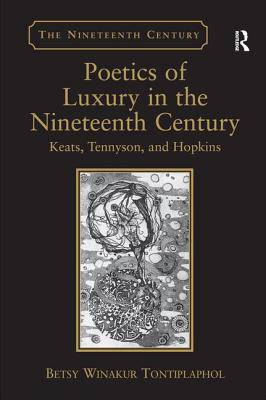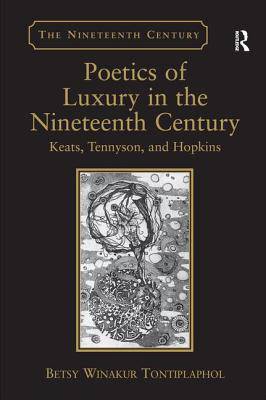
Door een staking bij bpost kan je online bestelling op dit moment iets langer onderweg zijn dan voorzien. Dringend iets nodig? Onze winkels ontvangen jou met open armen!
- Afhalen na 1 uur in een winkel met voorraad
- Gratis thuislevering in België vanaf € 30
- Ruim aanbod met 7 miljoen producten
Door een staking bij bpost kan je online bestelling op dit moment iets langer onderweg zijn dan voorzien. Dringend iets nodig? Onze winkels ontvangen jou met open armen!
- Afhalen na 1 uur in een winkel met voorraad
- Gratis thuislevering in België vanaf € 30
- Ruim aanbod met 7 miljoen producten
Zoeken
€ 195,95
+ 391 punten
Uitvoering
Omschrijving
Beginning with John Keats and tracing a line of influence through Alfred Lord Tennyson and Gerard Manley Hopkins, Betsy Tontiplaphol draws on established narratives of the nineteenth century's social and literary developments to describe the relationship between poetics and luxury in an age when imperial trade and domestic consumerism reached a fevered pitch. The "luscious poem," as Tontiplaphol defines it, is a subset of the luxurious, a category that suggests richness in combination with enclosure and intimacy. For Keats, Tontiplaphol suggests, the psychological virtues of luscious experience generated a new poetics, one that combined his Romantic predecessors' sense of the ameliorative power of poetry with his own revaluation of space, both physical and prosodic. Her approach blends cultural context with close attention to the formal and affective qualities of poetry as she describes the efforts of Keats and his equally"though differently"anxious Victorian inheritors to develop textual spaces as luscious as the ones their language describes. For all three poets, that effort entailed rediscovering and reinterpreting the list, or catalogue, and each chapter's textual and formal analyses are offered in counterpoint to careful examination of the century's luscious materialities. Her book is at once a study of influence, a socio-historical critique, and a form-focused assessment of three century-defining voices.
Specificaties
Betrokkenen
- Auteur(s):
- Uitgeverij:
Inhoud
- Aantal bladzijden:
- 222
- Taal:
- Engels
- Reeks:
Eigenschappen
- Productcode (EAN):
- 9781409404897
- Verschijningsdatum:
- 28/05/2011
- Uitvoering:
- Hardcover
- Formaat:
- Genaaid
- Afmetingen:
- 156 mm x 234 mm
- Gewicht:
- 489 g

Alleen bij Standaard Boekhandel
+ 391 punten op je klantenkaart van Standaard Boekhandel
Beoordelingen
We publiceren alleen reviews die voldoen aan de voorwaarden voor reviews. Bekijk onze voorwaarden voor reviews.











